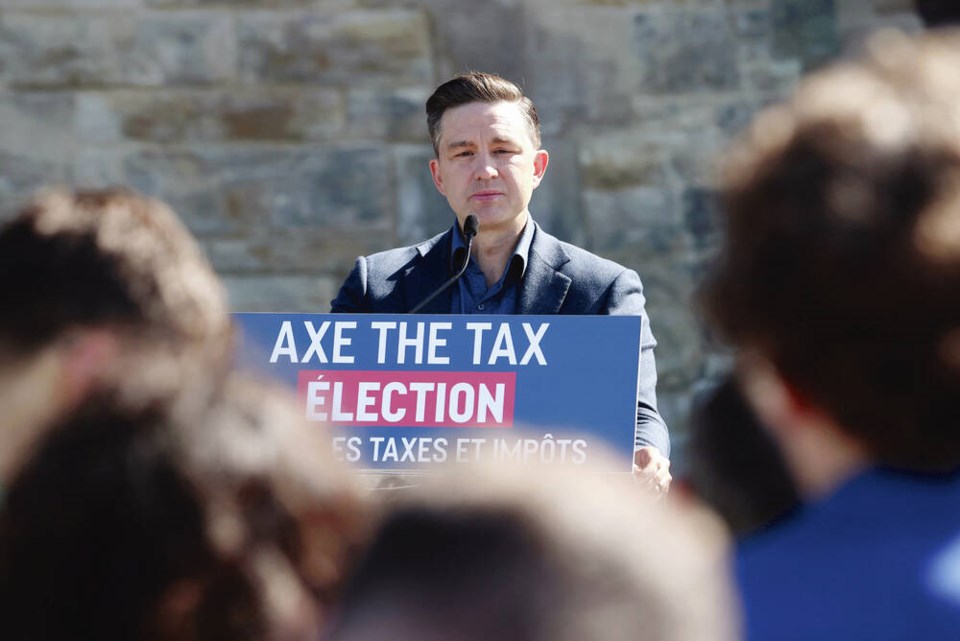By proclaiming that the carbon tax “is an existential threat to our economy and our way of life” and that it threatens a “nuclear winter” for the economy, Pierre Poilievre has entered the world of full-on craziness and inverted logic.
The reality is exactly the opposite. The “carbon tax” — actually, a form of pollution pricing, as the Supreme Court of Canada has confirmed — is not an existential threat to our economy and way of life.
On the contrary, it is our economy and way of life that poses an existential threat to large parts of humanity, other species, and global and regional ecosystems.
The pursuit of endless economic growth — a ridiculous concept on a finite planet – to support a way of life that generally makes us greedy for more stuff undermines the very fundamentals of human existence and wellbeing: the Earth’s natural systems.
Moreover, far from causing a nuclear winter — an absurd and vastly over-reaching analogy anyway — carbon pricing is one way to prevent the ongoing overheating of the planet, which has dire consequences for future generations.
Of course, Poilievre is not alone — although his idiotic “axe the tax” slogan and his desire to label the next election a “carbon tax election” is especially perfidious.
Getting rid of carbon pricing has now been cravenly embraced by the federal NDP and numerous provincial premiers, including David Eby here in B.C., prompting B.C. Green Party leader Sonia Furstenau to state: “This is a government with no principles and no direction.”
Furthermore, because there is a federal carbon pricing system in place, upheld by the Supreme Court, dropping the tax in B.C will have no effect, since the federal system will kick in, as it does in other provinces.
A helpful explainer in The Narwhal points out “the pool of money the federal government collects through the price on carbon is redistributed to all Canadians” via the Canada Carbon Rebate, while “Money collected through carbon levies for industrial emitters [is] returned to the provinces and territories and [is] meant to fund greener technologies.”
In abandoning the NDP’s support for carbon pricing, as Zero Carbon columnist Chris Hatch noted last week in Canada’s National Observer, Jagmeet Singh completely ignored the benefits of the rebate to working people. The same applies to David Eby.
Eby’s chief rival, B.C. Conservative leader John Rustad, is even worse. He appears to remain at heart a climate-change denier, downplaying the importance of climate change, suggesting that scientists are still debating whether humans contribute to climate change and denying it’s a crisis.
He says, wrongly, that carbon pricing is “an economic disaster and an environmental failure,” that it drives up prices while failing to lower emissions.
However, Canada’s independent Ecofiscal Commission, in an open letter in March signed by 335 leading economists from across Canada, stated: “Not only does carbon pricing reduce emissions, but it does so at a lower cost than other approaches.”
Moreover, the evidence shows it “has a negligible impact on overall inflation.”
So what exactly is carbon pricing? Well, it’s a form of pollution pricing, a small step on the way to all of us paying the full cost for the natural resources we use, the environmental harms we cause and the health and social damage currently accruing to future generations.
But the sad reality is that politicians of all stripes have little or no concern for the wellbeing of future generations, or even of today’s young people, for one simple reason: The future doesn’t have a vote. And so we get empty and idiotic slogans masquerading as policy.
So in the spirit of these times, I propose another slogan to counter Poilievre’s foolish “axe the tax” – “Pay the price.”
Either we start paying the full cost of our depredations on the planet’s ecological systems and natural resources, or our children and grandchildren will be paying the price in societal disruption, decline and possible collapse, with all its attendant misery, illness, injuries and premature deaths.
Paying the full price seems like a bargain to me, and certainly it will seem that way to our descendants, while failing to do so will be seen as a craven abandonment of future generations by our current so-called leaders.
Dr. Trevor Hancock is a retired professor and senior scholar at the University of Victoria’s School of Public Health and Social Policy
>>> To comment on this article, write a letter to the editor: [email protected]



